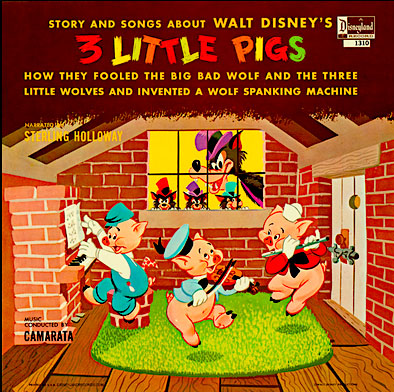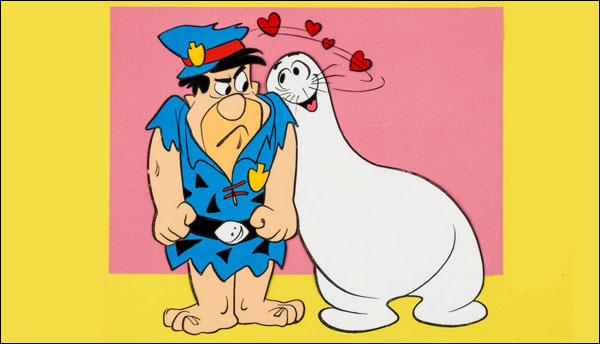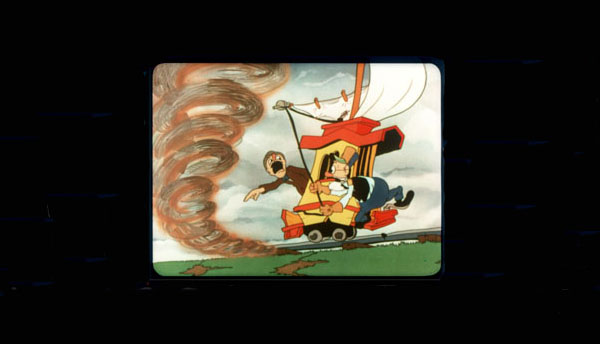A big, good look at Disneyland Records’ album of stories from the 1933 Silly Symphony, Three Little Pigs, plus two sequels narrated by Sterling Holloway and soundtrack excerpts.

The Stories and Songs of Walt Disney’s
THREE LITTLE PIGS
How They Fooled the Big Bad Wolf & Three Little Wolves and Invented a
Wolf-Spanking Machine
Narrated by Sterling Holloway
Disneyland Records ST-1910 (12” 33 1/3 RPM / Mono / 1961)
LP Reissues: Disneyland DQ-1310 (1966) ST-3963 (With Book / 1967)
Executive Producer: Jimmy Johnson. Producer/Musical Director: Camarata. Musical Directors: Frank Churchill, Paul Smith. Running Time: 23 minutes.
Studio Voices: Gloria Wood (Three Pigs); Jimmy Macdonald (Big Bad Wolf).
Soundtrack Voices: Billy Bletcher (Big Bad Wolf in Soundtrack Version), Pinto Colvig (Practical Pig); Leone Ledoux (Little Wolf); Alice Ardell (Little Wolf).
Songs: “Who’s Afraid of the Big Bad Wolf?” by Frank Churchill, Ann Ronell; “Schweine Stew” by Frank Churchill, Rafaella Pensa.
Stories: “Three Little Pigs,” “The Wolf-Warning Horn,” “The Wolf Spanking Machine.”
This is a very unique disc among the early Disneyland story records narrated by Sterling Holloway. They were usually studio productions with original music and little, if any, soundtrack material. This entry is an exception in that it offers a few nice bits from Silly Symphony cartoons starring the Three Little Pigs.
The 1933 cartoon was a landmark, establishing the Disney studio for animation of characters with distinct personalities, rather than movement for movement’s sake. It was a gigantic hit, sometimes attracting people to theaters regardless of what feature was also playing. The film also provided Walt Disney with his first hit song, “Who’s Afraid of the Big Bad Wolf?” which became a metaphor for the Depression, when “the wolf (creditors) was at the door.”
The Disneyland album opens with Holloway cueing up Camarata’s six-minute musical adaptation of the short, recorded in 1958 for the Official Mickey Mouse Club Record label. It was one of the most flexible of recordings, surfacing on 45 and 78 RPM singles for decades.
 The fully orchestrated mini-production also appeared on side two of the first Three Little Pigs 7” read-along book and record set and on the compilation albums The Littlest Outlaw and Other Stories, Walt Disney’s Merriest Songs and 50 Happy Years of Disney Favorites. There is a short musical intro that is or is not included, depending on the reissue, but you can hear the whole thing here, on its first 45 RPM release.
The fully orchestrated mini-production also appeared on side two of the first Three Little Pigs 7” read-along book and record set and on the compilation albums The Littlest Outlaw and Other Stories, Walt Disney’s Merriest Songs and 50 Happy Years of Disney Favorites. There is a short musical intro that is or is not included, depending on the reissue, but you can hear the whole thing here, on its first 45 RPM release.
The remainder of the album consists of Holloway telling two stories called “The Wolf-Warning Horn” and “The Wolf Spanking Machine” on the Silly Symphony sequel Three Little Wolves (1936), adapted to become two stories instead of one. When the album was first released in 1961, the back cover was printed with line art and a plastic coated paper so kids could color the pictures with crayons and wipe off the colors over and over again (several albums, like Peter Pan, had this feature). The coloring feature was not included on the 1966 reissue, a color illustration was substituted.
On the 1961/66 covers, the three little wolves are seen with evil grins, but this doesn’t reflect the recorded adaptation. Sterling Holloway’s narration reflects the way the little wolves had later been presented in comics and storybooks long after the original films had been released: as two bad little wolves and one good little wolf. This was for the 1967 Storyteller reissue, in which one good little wolf is differentiated in all the illustrations.
The Practical Pig includes a song called “Schweine Stew.” According to J.B. Kaufman and Russell Merritt in the liner notes for the Silly Symphony Collection [http://www.ebay.com/itm/Various-Artist-Silly-Symphony-Collection-1929-1939-Vinyl-New-/131808216160?hash=item1eb061c460:g:FQcAAOSwXshWqrLJ] LP set, the song is “based on a traditional German polka that had become a staple of vaudeville. A version of the tune was recorded by Danny Kaye as “Schnitzelbank” — and also by Jimmie Dodd and the original Mouseketeers.
In 1978, Jymn Magon produced a cleverly edited version of Camarata’s rendition that allowed Linda Gary’s narration to match a newer read-along book.


“Three Little Pigs” Side One – Sterling Holloway
The first half of side one consists of the Camarata musical story of Three Little Pigs and the story from The Practical Pig.
Fisher-Price also released its own read-along cassette and book, packaged with a Grolier hardcover book, upon which Hal Smith narrated over the actual 1933 soundtrack.


 GREG EHRBAR is a freelance writer/producer for television, advertising, books, theme parks and stage. Greg has worked on content for such studios as Disney, Warner and Universal, with some of Hollywood’s biggest stars. His numerous books include Mouse Tracks: The Story of Walt Disney Records (with Tim Hollis). Visit
GREG EHRBAR is a freelance writer/producer for television, advertising, books, theme parks and stage. Greg has worked on content for such studios as Disney, Warner and Universal, with some of Hollywood’s biggest stars. His numerous books include Mouse Tracks: The Story of Walt Disney Records (with Tim Hollis). Visit 





















































The Schnitzelbank (sometimes spelled Schnitzel Bank) song was also sung by Mel Blanc under the title “Yah Das Ist Ein Christmas Tree” – and the Animamiacs sung thier version of Schnitzelbank entitled “The Friendship Song” in one of thier episodes.
Actually, recordings of “Schnitzelbank” go back at least to the early 1920;s–if not before.
The form of the song–which is as agglutinative as the German language itself–can be found in songs as old as “The Twelve Days of Christmas”, and as recent as Julius La Rosa’s 1953 hit “Eh, Cumpari”.
Another cartoon song tat uses this format is “Johnny Shmoker”, which appeared in a recently-posted “Oswald the Lucky Rabbit” cartoon.
Jimmy MacDonald voiced the Big Bad Wolf in that Camarata version? I thought it was Sam Edwards…
Of course, since I cosplay as the Big Bad Wolf, I’ve done a few things relating to those records. I have had the wolf (me in character) often complain how the wolf’s voice in the Camarata version sounds nothing like him, like in this review of the 1965 read-along…
https://www.youtube.com/watch?v=u6B6DsDTa6s
I read that Sam Edwards,did,too., I was a kid in 1967 so had one of the original copies of the 1967 book (with that much used 1960s font that three years later would be The Partridges'[s font on both the 1970 TV show and misbegotten 1974 HB adapation, and for Fleetwood Mac, at that time the font was already used by a number of popular hitmakers,including Peter, Paul and Mary, who may have been the first.) Enjoyed the “Wolf spanking machine” which was used in both additional stories,,I forgot about the two seperate stories, not just one, and in addition there was one or two more 3 little pig cartons. It REMAINS a landmark, and should havce its own Disney World/Disney land ride.
It’s been a tough call for me, and I may have identified it as Sam in the past. He appeared on Disney records as early as 1961 (The Absent Minded Professor), but Jimmy was on so many in the late ’50s as Goofy, Willie the Giant, the Grasshopper and others, in addition to doing sound effects, it’s more likely to be him, and it sounds more like him than Sam. To compare, listen to his HippoGyraf voice on The Tin Woodman of Oz LP. He says “straw” differently.
The “good wolf” on the 1967 cover looks like the familiar “Li’l Bad Wolf” character from the comics. It makes me wonder if any attempt was ever made to explain what happened to Li’l Bad’s bad brothers, because in the comic books, Li’l Bad and his dad Zeke Wolf live alone in a cottage in the woods.An interesting story could be made out of the departure of the two other little wolves. Maybe they ran away from home like Walt Disney’s two older brothers?
Sterling Holloway delivers a nice performance in this recording.
Your reference to the compilation album “50 Happy Years of Disney Favorites” brings back a lot of happy memories for me. 1973 was a banner year for Disney enthusiasts. The album appeared some time in the spring–at least I remember getting it as an Easter gift. That whole year there were several Disney TV specials commemorating the anniversary, and most Disney merchandise released that year featured the mouse-ears “Happy 50 Years” logo. It appeared on assorted Disney comic books, and on the cover of every 1973 issue of “Walt Disney’s Comics Digest,” starting with an issue-long tribute to Mickey Mouse that contained reprints of 3 of Mickey’s classic adventures. It was a very, very big deal in 1973. Alas, today it is barely remembered. I can only find a trickle of stuff on the Internet regarding the “50 Happy Years” celebration. How about it, Greg? Would you consider a review of the compilation “50 Years” album that possibly might incorporate some of the highlights of that special Disney year? If you have any inside knowledge of the year-long campaign I would love to read about it.
That’s a good idea, Frederick. The 50 Happy Years album is very special to me, too. Maybe I’ll do post about several compilations, something like that. I have written about Music Cavalcade and The Music of Walt Disney, but where are lots more. Have to think about it. Thanks!
I prefer the Capitol Records’ version of THE THREE LITTLE PIGS with Don Wilson, of Jack Benny fame, doing the narration. It was originally available on 78 rpm records and then was made available as a long playing record in the late 50’s or early 60’s. The original Disney theatrical cartoon is still one of my all-time favorites.
I reviewed that one as well in character as the Big Bad Wolf, where he’s more pleased to hear his actual voice instead of Jimmy MacDonald’s eerie menacing version…
https://www.youtube.com/watch?v=Um9r1VghqOg
And here’s a new review I did in character as the Big Bad Wolf of the 1978 “Three Little Pigs” read-along, with my newer Big Bad Wolf fursuit head! (And I give your book and this site a shout-out too!)
https://www.youtube.com/watch?v=OF-APmK0WoM
Among early vaudevillians doing “Ist Das Nicht Ein Schnitzelbank” was Groucho Marx in 1910, as part of The Six Mascots which included brothers Harpo and Gummo, mother Minnie and aunt Hannah.
pinto colvig the original voice of goofy and sterling halloway the original voice of winnie the pooh